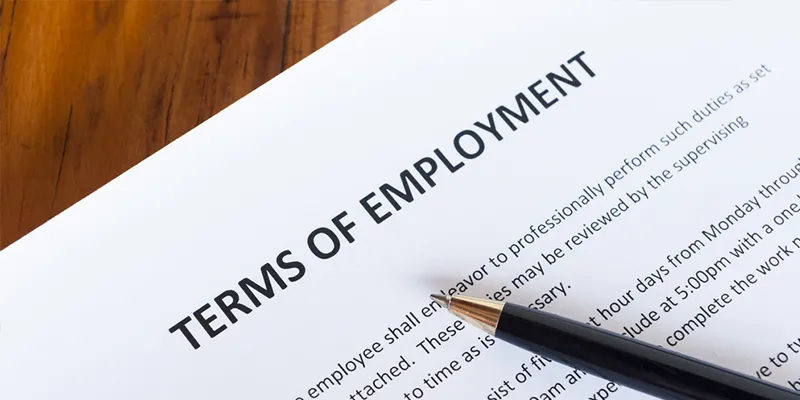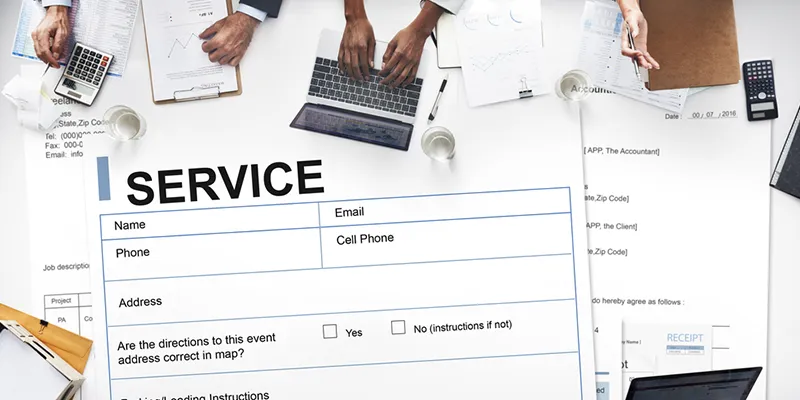6 contracts that every startup founder has to negotiate
As a startup founder, you wear many hats. At the very beginning, you have to face the prospect of making many decisions and negotiations - regarding the product, the market, the finances, and so on.
The validity and relevance of these decisions hinge on your ability to comprehend and negotiate contracts that define the relationships you have - with co-founders, with investors, with key clients, and vendors. Contract negotiation is a key skill of an entrepreneur.

“Timing, perseverance, and ten years of trying will eventually make you look like an overnight success.” - Biz Stone, Twitter co-founder.
What are the contracts that a startup founder should make an effort to learn about? There can be several, but here are the six agreements you are likely to come across in your life as a startup founder.
Founder Agreements

If you have followed the long, convoluted legal proceedings against Facebook CEO Mark Zuckerberg, or seen the movie ‘The Social Network’, you will know how important founder agreements are.
Imagine what would have happened if the Winklevoss twins had signed a founders agreement with Mark Zuckerberg? Maybe they could have signed a work-for-hire agreement instead. However, the twist was, they signed nothing. The later twists in the story all depended on that one decision.
Closer to home, ask any of the startups that failed due to co-founder conflicts, and they will tell you how they erred by not signing, or drafting, a good founder agreement.
No startup stands a chance to succeed without the founders being clear of their duties and responsibilities. A founder agreement is literally an assessment of the number of issues that they may face regarding their company, and shared journey as co-founders. It keeps things fair and predictable between founders.
Most founders build their startups with the people they trust. Friends or colleagues they have known for a long time, or maybe a brother or wife, who bring in their own expertise complementing the former, or maybe just capital or connections that are critical at the beginning.
Most of them assume all parties can trust one another, and start with just a handshake deal or verbal agreements. This is very common.
Eventually, one of the founders realises the other side is not really holding up their side of the bargain, not doing enough for the venture, or maybe even engaging in unethical conduct.
Sometimes a founder tries to extract more than his or her fair share from the business, or two co-founders irreconcilably disagree on the direction the business should take or maybe about where it is headed. Founder disputes are the number one reason for failure of startups, and almost all startups that succeed at a small or big level go through some degree of co-founder conflict.
Without a proper founders’ agreement in place, there is no end to the headache you might have to face. At the end of the day, it is a business with real and growing stakes, and no amount of trust or kinship will save you when you do not have a well-drafted agreement that all parties agree to abide by right at the beginning.
Regarding the incidents inspiring the movie ‘The Social Network’, the Winklevoss twins, Tyler and Cameron made a similar mistake. They brought their product ‘ConnectU’ to Zuckerberg, and expected him to finish coding it without any contract in place. They later mentioned having a verbal contract with Zuckerberg, which promised him direct fees for his coding services along with a stake in the company.
Instead, Zuckerberg decided to start his own company called ‘thefacebook’. The Winklevoss twins allege Zuckerberg stole the concept from their original product, ‘ConnectU’. A decade of legal disputes later, Zuckerberg still retains the ownership of Facebook, while the Winklevoss twins had to be satisfied with a $65 million settlement. What if the Winklevoss twins had, instead, got Zuckerberg to sign a Founders Agreement at 15 percent? Imagine that for a moment.
In my own case, there was a serious co-founders dispute that broke out in the third year after going into business. It is said you must drink the wine you sell. We did enter into an elaborate co-founders agreement, which pretty much saved the day for us, as what was to be done in case of a co-founder conflict was clearly written down in the agreement which was eventually incorporated in our LLP agreement.
Investor Agreements

The picture above is in reference to Flipkart’s biggest investor/shareholder Softbank.
Any startup requires investments to get off the ground, and people often start by putting in their own money, but venture capitalists and angel investors have to come in for any serious capital to be raised.
If a prospective investor wants to invest in your company, he will present you a term sheet. Term sheets refer to the agreement that detail the various terms and conditions under which an investment can be made. It is more like an initial offer to invest as long as certain conditions are met.
As a startup founder, you need to know whether or not you can work under those set terms or negotiate accordingly as term sheets are precursors to more detailed legal documents which would come in later. It is very important for you to possess the knowledge and understanding of the terms and conditions under which an investor would agree to provide their money to your startup.
It is a basic rule of thumb to be prepared to the tee before entering a negotiation. You have to have a basic idea of your rights, what you are entitled to, the responsibilities and what you are willing to give up. There are even courses that can help you to prepare for negotiation with investors. Just like you would not walk into a boxing match unprepared, do not go into an investment meeting without a clear idea about what terms are acceptable to you, and which ones are not.
If the termsheet works for both sides, you then sign it and move on to the next step of the procedure.
The investors then do their due diligence. This process can take a considerable amount of time as they verify all of your claims, and make sure the startup is up and clean, and that there are no hidden risks. They take a lot of things into consideration like ownership of intellectual property, exposure to regulatory or compliance risk, profitability and valuation of existing inventory.
If they find discrepancies, they will either make changes to the final document or not invest in your startup at all. However, if all goes well, they will come on board at this point and you can get into further negotiations.
It is important for you to know that the term sheet is just like a trailer. For any seasoned investor the real deal, the movie, is the shareholders’ agreement. Startups don’t usually have a lot of leverage in these negotiations unless they have multiple options to get investment.
The psyche of any startup is such that they usually cave in to all investors’ demands. Thus, it becomes even more important for you to be able to negotiate. You have to stand firm on what is fair for you and your company, without being a pushover just because someone is waving a lot of cash at you.
Remember that cash comes with a reciprocity in terms of equity. Negotiate here, preferably with support from an able lawyer with enough experience in similar deals. However, don’t let your lawyer run the entire show. Leaving it all to him is not a good idea. You should be involved in every step, understand each of the clauses that are being put into the agreement, consider long-term impact of those clauses and guide your lawyer on what outcome you want. Yes, that requires you to educate yourself first about this agreement.
The shareholders’ agreement is the last part of this process, and a binding contract between you and your investor. As a founder, you have certain rights and privileges. However, your ability to negotiate the shareholders’ agreement with your investors will dictate how much of these privileges you get to retain and at what cost.
To come out on top, you have to be an expert negotiator. You have to be precise about what you want, what your needs are, how much money you will require and an estimated time frame for you to deliver a finished product. But that alone is not enough. You also have to do your due diligence, and read up on your investors’ previous investments and how they progressed. Also find out all you can about their methodologies, how they have treated other founders - in short anything and everything that will give you a leg up in the negotiation. Learn it, own it, and do not sign the dotted line until you are satisfied.
Are you prepared? To asses that, think of this: Have you seen a few term sheets and investor agreements? Have you ever been part of such a negotiation? If not, then it’s unlikely that you are any good at it. Get some help, in the form of a good lawyer, or read up on the subject, look up some online courses about investment negotiations.
Employment Agreements

One of the first things that a startup founder has to do is hire the first batch of employees. You have to take into consideration that salaries are the main expense for most startups. In that regard, you have be to very good at negotiating with a prospective employee in order to get the best at the least possible remuneration. The process of an employment agreement negotiation is literally the first demonstration of your leadership to your new hire.
All expectations that the prospective employees may have about you and your company, about how they are treated and seen in the context of the company are built around this one face-to-face discourse. Setting clear limits on what you are willing to offer a new hire with regards to equity and wages shows your commitment to keep a steady hand in the face of conflicting priorities.
A successful negotiation would go on to showcase your acumen as a leader and as someone whose words are to be followed with the highest regard. After all, first impressions really matter a lot!
“The skillful employer of men will employ the wise man, the brave man, the covetous man, and the stupid man.” - Sun Tzu
To date, I have yet to find any comprehensive service that offers to teach startup founders, who don’t usually have HR backgrounds, the ins-and-outs of hiring. After all, getting good employees in a tight budget is no small task.
Non Disclosure Agreement and Trade Secret Agreement
When you put your heart and soul into creating something new such as a startup, you obviously want to protect it. You want to make sure that its’ “secrets” remain strictly within the inner circle. The things that make your product or service unique should instinctively be carefully guarded. That is where non-disclosure agreements or more likely, trade secret agreements come in.
It is very important for any startup to protect its ideas and intellectual property to ensure no one else implement them before they do. I would make all senior employees sign such an Agreement, as do all major MNCs. You should have a few copies of this handy in your drawer!
The NDA or Trade Secret Agreement should state all the salient points that the parties concerned must keep confidential. It is often true that ideas may not always be as valuable as their execution, but innovation and fresh ideas are in fact the core of any startup. Thus, it is very important to keep that innovation intact within the company, and make sure it stays out of the reach of the public.
You will have to oversee that appropriate measures are taken to enforce the NDA or Trade Secret Agreement and ensure respect towards these through strict action if there is any breach.
If you want a better understanding of the kind of complications you might have to face, read through Microsoft CRM Solution Specialist Ben Vollmer’s post on MSDN. After a giant such as Microsoft endured a breach in confidentiality, it had to clear the air about the privacy of the information leaked, and whether or not it was still protected. After all, if Microsoft could face such issues, it makes sense for any startup you create to have strict agreements.
Commercial Leases

Startups need their own space. It doesn't matter if you start in a garage or in your dorm room, at some point you are going to need a commercial space. It is almost impossible to grow without having the right kind of working space, for which you will probably sign commercial lease as soon as you can afford it.
Also, for many startups, commercial leases may be even more important that if you have to open many stores or centres in different locations. If you are going to operate from a residential property for some time, it is probably fine. Do read up about the relevant laws though!
Office space is one of the most expensive things to consider for a growing startup. Apart from the money, which everybody remembers to negotiate anyway, do not forget to negotiate the smaller details like notice period, permitted usage after leasing and lock-in clauses.
Your commercial lease agreement should specify the term of the lease. On many instances startups get caught up in leases that are either for too long a time period, or too small.
As a startup, your priorities and needs might change and you would not want to find yourself in arduous situations regarding your office space.
It is thus better to get into small term leases with regular renewal options than a prolonged term. The lease should also have ample clarity regarding tenant improvements, alterations, repairs and replacements. It should also specify the rent escalation rate, as well as any future subletting as a result of reorganization in your company or changes in shareholding pattern.
It is important to have the right dispute resolution mechanism to avoid long winding litigations. You need to make sure that the person signing the rent agreement with you has the authority to do so, or a valid title, for that matter. You need to figure out what would happen if the landlord fails to pay utility bills and the electricity is cut off from your office - a common scenario in India. Many such scenarios are required to be addressed in the agreement.
Do not, however, only give importance to the leasing amount and ignore other conditions of the agreement. That is a common rookie mistake.
Service Agreements

As a newly established startup, you will need a lot of things to run day-to-day operations smoothly. To do so, you need services, ranging from internet facilities to operational software, as well as raw materials to manufacture your products. This is where service agreements come in. Service agreements make sure vendors provide services to you appropriately, and in accordance with set terms. It also ensures you pay your dues in a timely and organised manner.
Not every startup grows to be a billion-dollar giant. Some even fold up within a few months or years, without really taking off. Many of these companies are left with little or no money and end up defaulting on their payments.
We have all read about the Stayzilla case. As the founder of erstwhile Stayzilla had to find out, non-payment of vendor fees can turn into much more than a civil dispute. In this instance, he faced criminal proceedings with a 28-day judicial custody while bail applications were rejected twice. Months of deliberation, allegations of political involvement, and claims and counterclaims from either side have yet to draw a conclusion.
Political connections or not, this incident draws parallels with situations a lot of founders have had to face, barring the imprisonment. You would do yourself a favour making sure you have a good solid service agreement in place with contingencies in case of such circumstances.
Service agreements also act as statements of work aside from the obvious terms. These documents detail the nature of the deliverables and services. Separate agreements have to be drafted with separate entities to ensure optimum service. As a startup, you cannot afford to miss out on good deals, but it is also important to ensure the best quality.
As it is rightly said, there is no alternative to good quality. It warrants return business. Good vendors and tight service agreements will obligate either party to deliver the best products and services, which can then be utilised accordingly to ensure your startup’s goal are met.
Hence, you have to negotiate and get the best for your budget while making sure of high-quality results.

How can founders learn contract negotiation?
Experience is perhaps the best teacher, and you must get a lot of guidance from your mentors in the early days. We realise that in India’s rapidly-booming startup industry, most entrepreneurs are technical people.
They are not really aware of the legal compliances that their companies need to undertake, owing to which many of them suffer serious disadvantages. Most of them don’t really even understand the contracts they end up signing. Founders with a working knowledge of contract negotiation have a serious competitive advantage and a higher chance of success.
In 2012, iPleaders started a course on Entrepreneurship Administration and Business Laws to help entrepreneurs better understand corporate governance, and the various legal compliances that come with it. It includes a module on contract drafting and negotiations. You could also just learn contract negotiation from a course like this.
(Disclaimer: The views and opinions expressed in this article are those of the author and do not necessarily reflect the views of YourStory.)







